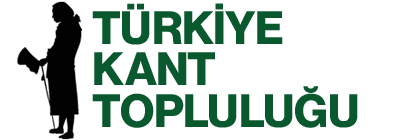TURKEY KANT SOCIETY: Membership and Principles
Turkey Kant Society (shall be abbreviated as TKS) is a community established on a volunteer basis to contribute to the Kant studies in Turkey.
MEMBERSHIP
TKS requests the studies of people who wish to focus on Kant studies and join the society to pivot around Kant philosophy. Therefore, for membership it is necessary to meet at least one of the conditions mentioned below. However, if one wishes to participate without meeting these criteria, they can apply to the Steering Committee of the Society with a petition including a detailed explanation of motives:
(i) Having obtained a master’s degree with a study on Kant’s philosophy
(ii) Having obtained PhD with a study on Kant’s philosophy
(iii) Having studied on Kant’s philosophy in the post-doctoral period
(iv) Having done at least one publication/translation on Kant’s philosophy in a refereed journal
(v) Having a book publication, either a copyright book or a translation.
FUNDAMENTAL PRINCIPLES
- TKS adopts transparency and participation as fundamental principles. All of its studies are based on this principle.
- TKS is based in Turkey but can conduct cooperation, joint projects and events to develop Kant studies with foreign people, institutions and organizations in both Turkey and abroad.
- The decisions are taken through consensus in TKS activities; it is decided by a majority vote when there is no complete consensus.
- Commissions can be established within TKS to speed up the decision-making processes. The establishment of commissions is based on voluntariness and election. A member who is elected and takes part in a commission reserves the right not to accept the duty. In such a case, another member with the highest vote is included in the commission in line with their consent.
- Studies based on solidarity and collaboration are encouraged and supported within TKS.
- TKS can make printed publications such as books and journals and/or digital, audio-visual broadcasts, organize events such as panels and conferences, and conduct activities such as educational activities, projects etc. Objective and academic criteria are observed in all these activities.
- Active participation is encouraged within TKS and active participation is expected from the members. Memberships of the members who have not been actively involved in TKS activities for 2 years may be suspended.
- Each member has the right to leave the society at any time by notifying the steering committee in writing.
- No member may act on behalf of the community without the consent of the steering committee.
ETHICAL PRINCIPLES
- Turkey Kant Society (TKS) stands against all kinds of violence, abuse, harassment, and discrimination based on race, religion, color, species, age, ethnicity, gender, sexual orientation, disability, political opinion, language as well as other categories.
- TKS does not tolerate plagiarism and similar academic violations and warns its members against such acts, and removes membership against acts of mobbing, plagiarism, violations of human dignity, and harassment as well as similar misconduct. These actions are not limited to the ones carried out within the body of TKS, but also includes all actions and behaviors of the individual that are noticed publicly. In determination of such violations, the members and/or members of TKS can apply to the Ethics Committee to initiate an evaluation process. After the evaluation of the case by the Ethics Committee, the committee forwards its assessment to the Board of Directors.
- In cases, such as plagiarism, when producing a proof is possible, the Committee takes the proof as evidence, and in cases, such as abuse, when producing a proof is difficult, the Committee considers the statement of the individuals.
- TSK adopts a flat organizational structure in its activities and does not approve hierarchical and non-participatory practices.
- TKS is a non-profit organization. Members cannot obtain financial gain with their TKS identity whatsoever. Earnings gained from the activities of TKS can exclusively be used in its activities.
- Members who do not comply with the basic principles and ethical principles of the society may be warned or removed from the membership by the Board of Directors after considering the evaluations made by the Ethics Committee in accordance with Article 6 of the society regulation.
FORMATION/EXECUTION OF BOARDS
- All boards are determined by volunteering, nominating/being nominated, and selection processes.
- Different names are encouraged to take part in determining and renewing the members of all boards as much as possible. It is important to ensure the transfer of knowledge and experience during transfer proceedings.
- The ethics committee is one of the most fundamental organs of the community, and all other committees are obliged to abide by the ethical principles and observe the warnings of the ethics committee.
- Boards other than the steering committee, ethics committee and supervisory board are established in line with the needs and can be dissolved when there is no need.












